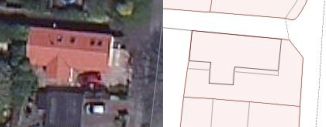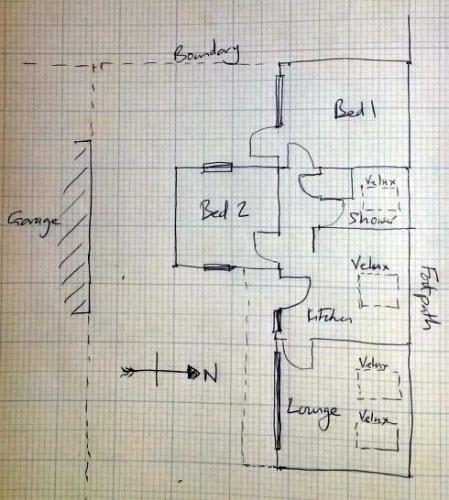Space Efficient House Means Cash Efficient Budget
Having seen and debated Calvinmiddle's 120 square metre 2 bedroom bungalow, I was musing on how large a dwelling actually needs to be in floor area - intending no particular critique of Calvin's decisions here.
In these days of £1500 per square meter build costs and soaring energy prices, should we take Occam's Razor to all those (possibly) extra bits we are adding to our self-builds? Rather than learning creating larger rooms and learning to do that one extra building trade ourselves, to save budget, is it possible to make different decisions and simply build less house instead?
Let me bring some personal experience to open a conversation about efficient use of space, as I think I have a good example of a well-designed and well laid out 2 bed bungalow, on quite a difficult site. Here is an aerial view and site plan, which is fairly tight, and built to the boundary on the North and West sides, preventing insertion of windows in those walls.
The history is that in 1960 this was a cowshed. In 1970 it became an architect's studio. By the 1990s the architect had moved out, and it was extended and became a 2 bed studio (literally) bungalow.
I don't, unfortunately, have a formal floor plan to hand, short of scanning in an architect's drawing, but the total floor area is 70 sqm, or 750 square feet, measured by adding up the floor areas of each room. So here is a very rough sketch plan from my log book:
Now 70 sqm is not very much area to most of us; but the place is surprisingly spacious, and everyone who has lived there loves it. This is the accommodation in detail, with brief notes:
- Entrance Hall: 3'11 x 11'11 (1.18m x 3.62m)
- Kitchen: 11'11 x 10'6 (3.64m x 3.19m). Space for dining table.
- Lounge: 14'8 x 14'9 (4.46m x 4.48m). Velux roof lights.
- Master Bedroom 1: 14'6 x 11'4 (4.42m x 3.45m).
- Bedroom 2: 10'4 x 11'9 (3.16m x 3.59m).
- Inner Hall: 3'10 x 7'6 (1.16m x 2.29m). Boiler/washer cupboard. Cloak cupboard.
- Shower Room: 6'7 x 6'9 (2.00m x 2.05m) plus 4'0 x 3'0 (1.23m x 0.92m). Velux roof light. Walk-in shower.
If I compare that with the "London Space Standard", which is the document about suggested reasonable minimum house sizes that politicians are currently rabbiting on about, we are quite close to the recommended minimum areas for 2 bed single storey homes:
- Space required for 2 bed 2 person single storey dwelling = 61 sqm.
- Space required for 2 bed 3 person single storey dwelling = 70 sqm.
- Space required for 2 bed 4 person single storey dwelling = 74 sqm.
The document, which is based on mapping out what furniture is needed for the number of people in each room, is well worth a read for self-builders wanting to explore how layouts can be organised.
Where then can self-builders save on space, and budget?
I'd suggest the design of my bungalow is efficient in these areas, and that two ideas to use are double use of space, and illusion to make spaces feel larger than is the case:
- Saving on circulation space - ie corridors and hallways. The Inner Hall and Entrance Hall total around 4.6 sqm, which is under 6% of total floor space. Since there is no wall between the entrance hall and the kitchen, part of that is also perceived to be part of a larger kitchen/dining area.
- The space budget is spent where most time is spent - the lounge, at 20sqm, is generous and square, with what amounts to a glass wall non the south side, and no dark corners due to Velux roof windows at the north side.
- A perception of space is helped by middling high cathedral ceilings (13ft) in the principal rooms.
There are mistakes as well - in this case the lounge is a little to open to view by passers by on the pavement if they look in a particular direction.
What have you done well or badly in your own project? How much dedicated circulation space did you create?
And there's a whole conversation to have about changes in circulation space from early times (no corridors) to 20C (corridors to avoid draughts) to 21C (no corridors since doors are now draught proof). I'll start a conversation about that another time.



13 Comments
Recommended Comments
Create an account or sign in to comment
You need to be a member in order to leave a comment
Create an account
Sign up for a new account in our community. It's easy!
Register a new accountSign in
Already have an account? Sign in here.
Sign In Now